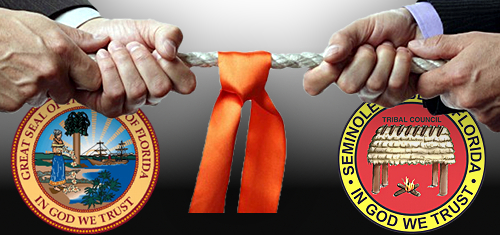 The state of Florida has filed a federal lawsuit against the Seminole Tribe, accusing the tribe’s casinos of offering card games in violation of state and federal law.
The state of Florida has filed a federal lawsuit against the Seminole Tribe, accusing the tribe’s casinos of offering card games in violation of state and federal law.
The state and the tribe struck a deal in 2010 giving the tribe exclusivity over house-banked card games at five of the tribe’s seven casinos – three in Broward county and two more in Immokalee and Tampa – for which the tribe guaranteed the state a minimum payment of $1b.
That gaming compact expired in July and this week saw the end of the 90-day grace period by which the tribe was supposed to cease offering games like blackjack, baccarat, pai gow and the like. Instead, the tribe is defying the state by continuing to offer the games.
The Seminoles are a federally recognized tribe, meaning the state lacks the legal jurisdiction to send in its own cavalry to force the Seminoles into toeing the line. So on Friday, the state’s Department of Business and Professional Regulation formally asked a federal judge to force the tribe to shut down their gaming tables.
The parties have been trying to negotiate a new gaming compact for over a year, but the Seminole’s offer of a seven-year, $2b guarantee – which would have been the largest deal of its kind between any tribe and state – failed to gain approval before the state’s elected officials adjourned their legislative session last summer. That deal would reportedly have allowed the tribe to add roulette and craps to its list of casino options.
Negotiations with Gov. Rick Scott resumed this year and while the tribe recently suggested “significant progress” had been made, the Seminoles filed a federal lawsuit of their own on Monday, insisting they had the right to continue using their gaming tables because Florida had broken the original compact by allowing state racetracks to offer electronic versions of casino table games.
Even if Scott and the tribe reach a deal, any new pact will have to be approved by legislators, who don’t start their 2016 regular session until January. However, the tribe has previously displayed little qualms about operating in a legal grey area.
In 2008, the Florida Supreme Court ruled that then-Gov. Charlie Crist had overstepped his authority by inking a gaming compact with the tribe without legislative approval. Undaunted, the Seminoles refused to stop to offering blackjack at their Hard Rock casino in Hollywood until the legal drama sorted itself out two years later.
